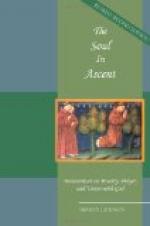Jesus reveals the way of escape and thus confers upon the race the greatest of possible blessings. This he does by the revelation of the Fatherhood of God, which is not only compassionate but also holy. Because God is the Father of all souls, when any one ceases to do evil and begins to do well, or in other words repents, he finds a welcome and help waiting for him. And Jesus clearly indicates, also, that in the constitution of the soul, and in the inexorableness of moral law, there is a deep remedial agency which is ever active, giving no individual rest until it finds it in God. The tragedy of the cross was preeminently a revelation. The cross is the manifestation, in terms of human life, of the passion of the universe and of God. There must be suffering in all who are good, until sin disappears.
The cross is the revelation of the Eternal God in sacrifice for the redemption of souls in bondage to selfishness and animalism. Jesus taught that sin is to be abolished. By means of the revelations of holiness, the sacrifices of love, the remedial agency in the universe, and by His own new life the forces of evil are to be broken, and the soul allowed to enter into its freedom as a child of God. This is not a subject for definition and dogmatism. The greatest things cannot be defined, but they may be appropriated. The light, the air, gravitation and all elemental forces transcend definition. The love of God revealed on the cross is too holy and too transcendent for “scheme and plan.” It may be accepted in a spirit of worship, but it can be comprehended no more than the process by which rain and soil are transmuted into nourishment, and light into physical strength and beauty. The cross is the pledge of the redemption of the soul through the love and power of God; and beyond that we have no knowledge except that wherever that cross has been lifted up men have been drawn unto truth and virtue, love and brotherhood.
More than poetry and sentiment has found expression in a popular hymn which thrills with a power which has been verified again and again in human history:
“In the cross of Christ
I glory,
Towering
o’er the wrecks of time
All the light of sacred
story
Gathers
round its head sublime.”
Jesus has furnished no clew to the origin of moral evil, but He has given to the hope that it is to be overcome in the individual, the race, and the universe, the testimony of His teaching and the emphasis of His death.
Which is the greater mystery, life or death? A satisfying answer is impossible, since we cannot think of one without thinking of its opposite. What is life? Whence is it? Why is it? Such are some of the questions which arise and elicit no response when one meditates upon the mystery of living. What is death? What purpose does it serve? Is it an end or a beginning? Such are some of the inquiries which cannot be escaped when one, for even a few moments, looks, as all some




